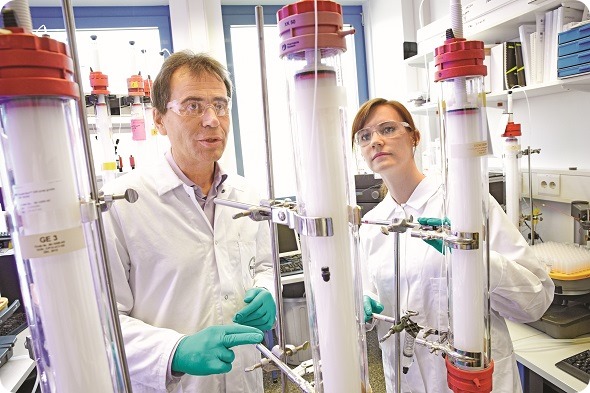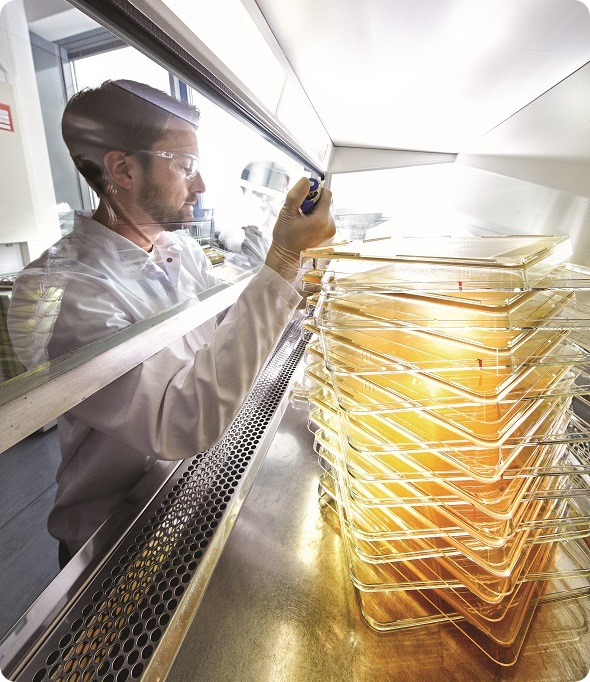The body’s immune system is an excellent weapon against many diseases. For more than 100 years, immunology and immunotherapy have played an ever-increasing role in the understanding and treatment of cancer. But only recently has it entered a renaissance phase with approval of multiple agents for the treatment of cancer.
The most recent immunotherapies use an exciting treatment approach that re-mobilizes the body’s own immune system to fight back against dangerous cancer cells that may have disguised themselves or put the brakes on the immune system.

Antibodies are purified from other proteins using column chromatography.
How effective has immunotherapy been at treating cancer patients so far?
The recent immuno-oncology therapies are revolutionizing treatment in some patients with certain types of cancers.
A group of novel drugs act to prevent the cancer from evading the immune system responses, and with this approach, a subset of patients, estimated to be 20 to 30% of the overall cancer population (including end-stage disease), have experienced impressive tumor response and long term survival.
In certain tumors such as melanoma, the results have been even more impressive. While these are important advances, we need to be cautious, as many patients - even ones who may be benefiting from the therapies - unfortunately will develop progressive disease. Thus it is important that multiple treatment options and modalities continue to be developed to further advance survival rates for patients.

Preparation of microtiter plates for an antibody screening experiment (Bayer laboratory, Cologne, Germany).
Are there any specific types of cancer that immunotherapy has been a particularly successful approach for?
Immuno-oncology has demonstrated impressive clinical benefits and improved survival, for instance, in melanoma and advanced lung cancer, as well as other cancers.
Clinical evidence is also suggesting there may be patient benefit in cancers of the kidney, liver, bladder and brain with immuno-oncology treatments.
However, there currently is a need for multiple treatment options, because too many cancer patients might not receive benefit from immunotherapy or will develop progressive disease while on immunotherapy. For these reasons, we at Bayer are taking a diverse, but focused approach in our oncology R&D efforts.
How about types of cancer that immunotherapy has not been very successful for?
While the use of the immunotherapy is not new, the scientific understanding of these treatment advances is still growing. Its use in certain cancers has not demonstrated the same clinically meaningful benefit as we have seen in tumor types like melanoma, but that doesn’t mean it can’t be successful in these, or other, difficult-to-treat cancers.
Bayer – and the industry at large – is making tremendous progress in identifying targets for further exploration across cancers. At last count, there are over 400 immuno-oncology clinical trials underway exploring multiple indications, combinations and more are sure to be added.
But also, one must not forget that in most clinical trials with the exception of a few, only approximately 30 percent of patients respond to current immuno-oncology therapies, like we saw consistently for one check-point inhibitor.
This means that, in most cases, at least 70 percent of these patients – nearly three-quarters of them – are still in need of other therapeutic options.
What needs to be done to address the types of cancer for which immunotherapy has not yet been very successful?
It’s critical that we continue to explore all treatment approaches, including targeted therapies, novel mechanisms or platforms, combination therapies or sequential use of immuno-oncology therapies with other anti-cancer agents.
Bayer continues to invest in oncology research. In immunotherapy, we are broadening our search to other areas of the immune system that can be activated against cancer. Bayer is collaborating with several international partners to discover novel checkpoint targets and develop corresponding monoclonal antibodies to address them.
Our goal is to significantly broaden the applicability of this breakthrough approach – specifically in cancer indications where current immunotherapies are not efficacious.
Our diverse approach to research also focuses on exploring our substantial small molecule inhibitor platform pathways, targeting specific oncogenic pathways, in addition to different biological approaches.
These include a series of antibody-drug-conjugates (ADCs), the most advanced being an anti-mesothelin-ADC in Phase II, as well as our novel targeted thorium conjugate platform, which represents the next evolution of radiopharmaceuticals and is an area that continues to see progress in advancing treatments for patients with difficult-to-treat cancers.
Other important pillars are the further exploration of critical biomarkers and novel target-discovery approaches such as oncogenomics through our strategic alliance with the renowned Broad Institute.

Scrupulous and sterile: antibody-based active ingredients are manufactured in conditions of absolute cleanliness.
How does Bayer plan to aid immunotherapy research and innovation moving forwards?
Bayer is embarking on several exciting early immuno-oncology projects to engage the body's own immune system to fight cancer. We are currently working with Amgen to explore the utility of investigational bispecific T-cell engager antibodies, or BiTE® antibodies.
BiTE® antibodies are designed to help dock killer cells to cancer cells. In the body, killer cells release substances that can destroy the cancerous cells. A first project is currently being investigated in prostate cancer in a Phase I clinical trial.
The quest for discovery of new immuno-oncology approaches is also one major focus area of Bayer’s strategic collaboration with the German Cancer Research Center (DKFZ) in Heidelberg, the largest cancer research institute in Europe, where a growing team from Bayer and the DKFZ are working together on new treatment strategies such as novel checkpoint-inhibitors to enhance the anti-tumor immune response.
In addition, Bayer has also initiated collaboration with the Israeli company Compugen in immuno-oncology, and is pursuing the research, development and commercialization of antibody-based therapeutics for cancer immunotherapy against two novel Compugen-discovered immune checkpoint regulators.
What do you think the future holds for immunotherapy innovations in oncology?
As we grow the body of evidence supporting this approach and gain a better understanding of the immune responses to different pathogens in addition to cellular and tumor biology, we will become better equipped to target and personalize treatment options.
Furthermore, we hope to better understand the long-term effects of immuno-oncology in the future, including the degree to which patients may be protected against recurrent malignancies, through the potential of our immune system developing memory cells capable destroying future cancer cells that resurface.
And of course, the importance of developing a diverse and effective mix of approaches that can be complementary to immuno-oncology cannot be overstated. Establishing a multitude of treatment methods in the future which target different structures in the body is the best way to ensure as many cancer patients can benefit as possible.
What is Bayer’s vision for the future with regards to immunotherapy?
Our hope is that the early promise of immuno-oncology will one day be replicated across a broader range of cancer types. But as there are over 100 different types of cancer that impact each patient differently, our ammunition to fight back must be equally diverse.
Immunotherapy is a powerful weapon, but it’s only one of many effective approaches – like antibody-drug-conjugates, targeted radiopharmaceuticals and novel small molecules – that Bayer is developing with the goal of improving the lives of people affected by cancer.
Where can readers find more information?
To find our more information about Bayer’s research focus in oncology, readers can visit http://pharma.bayer.com/en/innovation-partnering/research-focus/oncology/.
About Robert LaCaze
Robert joined Bayer as SVP, Head of Oncology TA in October 2015. He has more than 27 years of bio-pharmaceutical experiences most of which has been spent in specialty areas, mainly Oncology. Before joining Bayer, Robert was the SVP, Global Oncology with Bristol-Myers Squibb and co-led the Oncology Disease Strategy team with direct responsible to set the vision, strategy, and execution for the Immuno-Oncology (I-O) Franchise at BMS.
Robert currently serves on the Louisiana Tech College of Business Administration Advisory Board and is a member of AACR and BioNJ. He, his wife and two sons reside in Robbinsville, New Jersey.